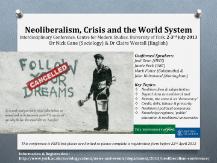Neoliberalism, Crisis and the World System

Tuesday 2 July 2013, 9.30AM to 3rd July, 2013
A two-day interdisciplinary conference exploring the economic and socio-political dynamics of 'neoliberalism' in relation to the contemporary 'crisis' of capital and set against a foundational concern with the capitalist world system.
Plenary speakers:
- Jodi Dean (Hobart and William Smith Colleges)
- Jamie Peck (UBC)
Other confirmed speakers include:
- Nick Couldry (Goldsmiths)
- Will Davies (Warwick)
- Mark Fisher (Goldsmiths)
- Ros Gill (King’s, London)
- John Holmwood (Nottingham)
- Stephen Shapiro (Warwick)
- Tiziana Terranova (Naples)
- Adam Tickell (Birmingham)
- Couze Venn (Goldsmiths)
- Anthony Carrigan (Keele)
In the wake of the global financial crisis there has been notable and widespread academic, political and public interest in what is meant by 'neoliberalism' - where it sprang from, what its relationship with liberalism is/was, what its economic impact has been/is, what it means for political institutions and their decision making, and how it determines our labouring lives. With big-name public intellectuals - such as David Harvey, Naomi Klein, Noam Chomsky, Slavoj Žižek and Stuart Hall - having written on and exposed neoliberalism’s place within capitalism’s development and on-going crises, it seems important that we continue to bring neoliberalism under closer scrutiny by probing its everyday manifestations and its large-scale ambitions, and by working to pinpoint its contradictions and weaknesses. Given that 'neoliberalism' is notoriously hard to define, this event seeks to address and track its historical emergence and account for its role in relation to the current economic and political climate. It will do so by placing key critical voices from the social sciences, arts and humanities in dialogue so that socio-cultural understandings of neoliberalism, and the capitalist world system, are offered in direct relation to economic thinking, models, claims and critiques. In short, this interdisciplinary conference will explore and examine the economic and socio-political origins and consequences of 'neoliberalism' in relation to the contemporary 'crisis' of capital and as set against a foundational concern with the capitalist world system.
A set of key questions underpins the event:
- Where did neoliberalism come from, how did it 'take hold', what is its reach and what are the consequences of its reach -geographically, economically, politically and culturally?
- How do we understand neoliberalism in relation to capitalism and the world system?
- What is the underlying economic logic of neoliberalism and how is it connected to, part of, and/or directing the current crisis?
- Is neoliberalism determined by particular economic and sociological understandings of what markets are and how they operate?
- Is neoliberalism tied to the emergence of new forms of subjectivity and cultural expression?
- In what ways is neoliberalism shaping our aesthetic activities and does it show itself in our contemporary idea/s of culture?
- How has neoliberalism shaped new forms of bureaucracy, of classification and audit - of accounting for life as opposed to experiencing it?
- What are the roles of institutions, specifically state-bound institutions and 'the university', under neoliberal conditions and how have they been influenced by a supposed 'neoliberal turn'?
- In what ways are work and labour altered (if at all) by neoliberalism and our relation to it?
Neoliberalism Conference Programme (PDF ![]() , 52kb)
, 52kb)
Neoliberalism Conference Poster (PDF ![]() , 6,999kb)
, 6,999kb)
This event is not for profit. There is no conference fee, only a registration form.
If you wish to attend please complete the Neoliberalism Conference Registration Form (MS Word ![]() , 26kb) and return to Carole Nicholson by 22nd April 2013 (places will be limited).
, 26kb) and return to Carole Nicholson by 22nd April 2013 (places will be limited).
For further information about the event please contact the organisers, Nicholas Gane (Department of Sociology) or Claire Westall (Department of English and Centre for Modern Studies).
The conference is funded by the British Academy, Centre for Modern Studies (York) and University of York pump priming.
Location: V/045, Vanbrugh College [2nd July] and Bowland Auditorium, Berrick Saul Building [3rd July]

